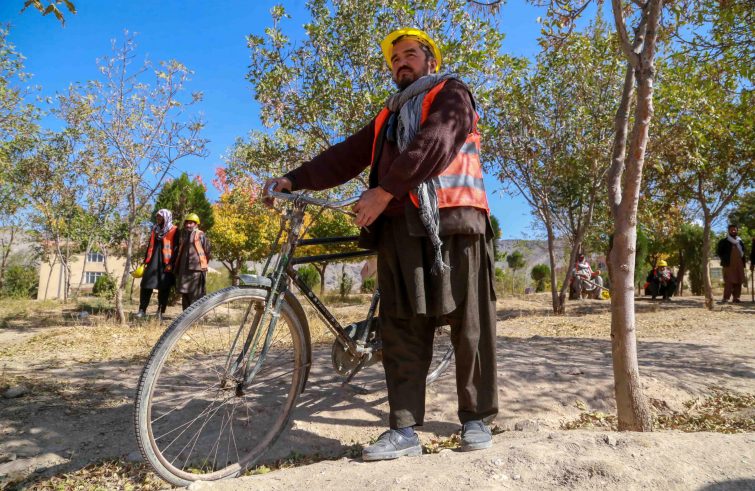
Despite the absence of war, hunger, violence and despair are shattering human lives. Ilario Piagnerelli, RAI news24 correspondent, was in Afghanistan until four days ago. He was first in Kabul, then in the central area of Bamiyan, where the Buddha statues were destroyed in 2001, near the Band-e-Amir lakes. During this time, he spent 15 days in the Taliban controlled country with a cameraman, Andrea Vaccarella. “We were forced to leave the city as the hotels were reportedly targets of an ISIS attack.” The Italian correspondent covered various war zones worldwide but had never been to Afghanistan: “I found it to be less dangerous than I thought. The Taliban control it with a reign of terror and for now, except for ISIS, they have no enemies. However, I didn’t expect so much poverty. The changes underway are visible. People queue outside banks that are running out of cash. Timber is expected to be in short supply this winter and the Government can’t pay electricity and food suppliers. We managed to visit the World Food Programme warehouse where tons of flour and cooking oil are sent from Uzbekistan by train. The WFP is trying to avoid Taliban middlemen but at the same time wants them to provide access to the territory.”
Although the country has been torn apart by wars, and the restoration of the Taliban regime has dealt a severe blow, the reporter said the local population is “extremely resilient in the face of adversity. A self-reliant people that knows how to move forward under challenging conditions.”
The news crew’s first encounter was with the Taliban. “They had been ordered by their spokesperson, Zabiullah Mujahid, to do everything possible to facilitate our work. They gave us sinister looks but smiled when they saw our permits. They are fully subjected to the will of the decision makers, they have no autonomy of their own. The local guide told us that when they seized power, those who joined did so motivated by the need to secure a better future for themselves.” The reporter described some dramatic incidents in the capital. “We saw a woman being prosecuted in a police station. She had been forced to marry a man with whom she had eloped and borne a child. She wanted a divorce but the Taliban and her family, who had brought her to the police station, disagreed. So we were faced with a clear example of what is happening in the judiciary with the imposition of Sharia law.” He also met with 73-year-old Afghan activist Mahbooba Saraj. “She could have fled the country but she decided to stay. She is a descendant of the royal family and says that defending her people runs in her DNA. She told me that the Taliban are not aware of the wealth they are seizing in homes – referring to learned young women compelled to stop working or studying – and pointed out that she will fight for their rights.” Ilario further mentioned interviewing a relative of a Californian NGO’s Afghanistan-based worker, one of the ten victims of the US drone strike past August that hit a vehicle mistakenly believed to be a car bomb. “The US State Department made reparation payments and will bring the family to the United States. He said that no remains were found of some of the children killed by the blast.”
The journalist also recounts a significant encounter with Diana, a 13-year-old girl he met with her family in the Lakes Region. “Diana dreams of being an astronaut. She told me in perfect English that she wants to continue studying and that she finds it absurd that girls are not allowed to go to school.” One of the reportages Ilario managed to complete in Afghanistan was under the bridges of Kabul, where drug addicts were rounded up and deported en masse by the Taliban, officially declaring that they would destroy the opium poppy fields used to produce heroin.
The trip back to Italy was an ordeal for Ilario and the cameraman: “At the border with Uzbekistan police officers denied us entry, claiming that the passage was closed due to the elections. We were turned back for three days and were constantly in touch with RAI and the Foreign Ministry. Every time we left Afghanistan, the Taliban stamped our passports, and it was hard to explain why we were being denied entry. In the end, we managed to board a plane thanks to an Italian NGO.”
When asked if he was ever afraid, Ilario recalled that one night, at yet another checkpoint, one of the soldiers was wearing a headband with the inscription “Allah is one and Mohammed is his prophet”. “We were scared because our guide had warned us that whoever wears it is a potential suicide bomber, but nothing happened.”
The reporter did not have a chance to meet the Catholic community, but he remembers finding himself outside the building of the former Italian embassy where Kabul’s only Catholic church used to be. “The embassy is not believed to have been looted unlike others and is now inhabited by the Taliban. We discovered that a communication had been established with Italy. When we requested to visit the former diplomatic seat, the Taliban called Doha, where the Italian embassy was sheltered. In fact, the Foreign Ministry immediately got in touch with us. In prospect, it may reopen, sooner or later.” Ilario recalled the humanitarian disaster of numerous children begging in the streets. “They tap on car windows until they receive a coin or something to eat.” And finally, what is perhaps the most painful image of all: a burqua clad woman with a child in her arms, seated in the middle of a busy roadway asking for money. “An image I’ve never seen. It was very upsetting. They were putting their lives at risk at every instant.”












